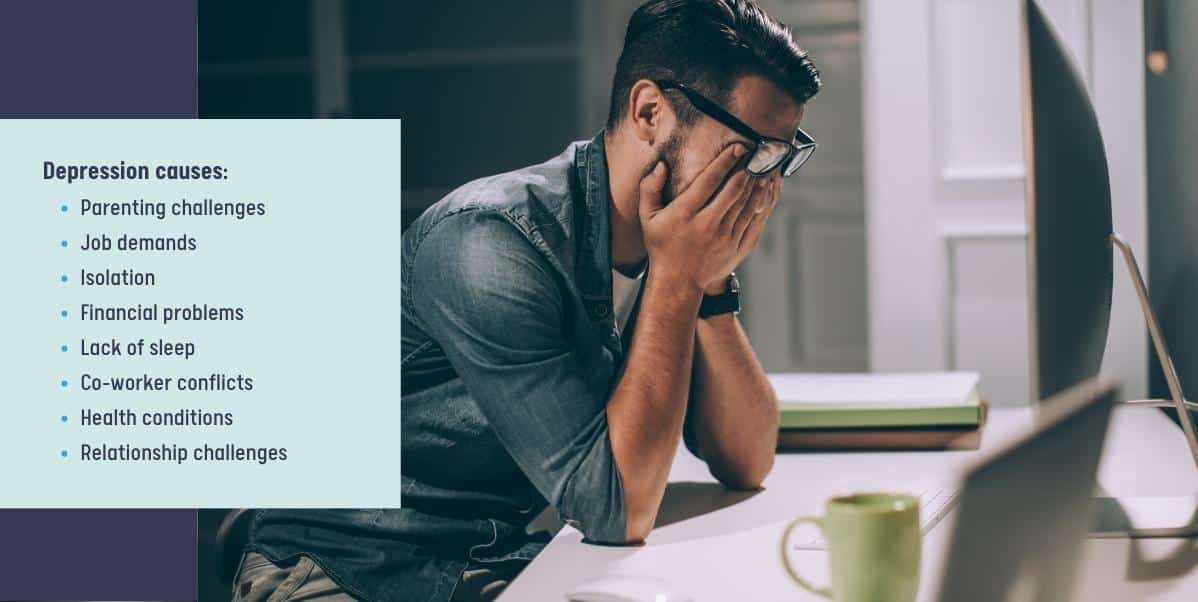
Depression is not solely linked to catastrophic events or trauma. Anyone can experience depression, including those who appear to have a good life. Experiencing depression when everything seems to be fine can cause frustration and guilt.
When someone is living with depression, and at the same time, their life feels blessed, it is easy for such a person to invalidate those feelings of depression. Most people fail to realize that depression does not discriminate based on good or bad fortune. Your feelings are real and valid.
In this article, we will explain why you might feel depressed even when life seems good for you.
Why Am I Depressed for “No Reason?”
Depression is not a fleeting emotion; therefore, you don’t need a reason to feel depressed. However, when you can’t tell the cause of depression symptoms, it becomes challenging to open up about your feelings.
You might feel doubted or stigmatized by those around you. Asking a question like “What do I have to be depressed about?” can make you feel guilty or embarrassed about your symptoms. Shame and guilt can be powerful forces that might make you act like everything is fine when, in reality, you are feeling alone and isolated.
A study published by the National Library of Medicine shows that stress can interrupt chemical messages in the brain, especially in the regions that control emotion and mood. When this happens, chemical messengers in the brain become unbalanced over time, causing the brain’s neural transmitters to deteriorate. In some people, this might trigger symptoms of depression.
People respond to stress differently, and what’s distressing to one person might not be so to another. What might appear as depression “for no reason” can be depression due to immense job responsibilities, sleepless nights, or unending everyday pressures. As such, depression and stress are unique to your circumstances.
It is also worth noting that certain risk factors increase your chances of experiencing depression. These factors include:
- Chronic stress and loneliness
- Genetics
- Environmental exposures such as abuse, violence, poverty, and neglect
- Personality predispositions such as low self-esteem and pessimism
The Lived Experience of Depression
People in good physical health, employed, financially stable, have a safe home, supportive friends, and hobbies often struggle to comprehend why they feel persistently sad, irritable, or angry. Without a clear trigger, such as a divorce, death, or job loss, one can feel that it doesn’t make sense for them to feel depressed.
Perceptions of Depression
The presence of things that make life comfortable might make one feel that they have no reason to be unhappy. Those whose families have no history of depression may also assume they couldn’t be genetically prone to depression.
Similarly, someone may look back on their childhood and get concerned or confused if they fail to find a specific event that would justify the feeling of depression. When one realizes that people around them are not experiencing depression, it can feel lonely, and most people start to worry that others will think they don’t appreciate what they have if they appear down or sad.
You might even start worrying about being a burden to others or being viewed as a liability. People battling depression may also get concerned about speaking up due to fear of what might change at work, school, or in their relationships.
Hidden Causes of Depression
Depression does not always manifest because of your current life circumstances. Having a good life in the present doesn’t negate the fact that you might have had a traumatic past. Most of the beliefs and habits you carry into adulthood are due to your learning experiences as a kid.
Negative exposures during childhood, often known as adverse childhood experiences (ACEs), can significantly affect your adult life. Though often caused or associated with events of violence and abuse, ACEs aren’t always traumatic.
They can also result from absent parents, school bullying, and living in unsafe neighborhoods. ACEs are one of the factors behind symptoms of mental health conditions like depression. According to a study by the Centers for Disease Control and Prevention (CDC), 61% of adults report experiencing at least one adverse childhood experience. The same study also shows that about 21 million cases of depression have been linked to ACEs.
Other hidden causes of depression include, but are not limited to:
- Parenting challenges
- Job demands
- Isolation
- Financial problems
- Lack of sleep
- Co-worker conflicts
- Health conditions
- Relationship challenges
- A missing sense of purpose
- Undeveloped coping mechanisms
Depression doesn’t always come from one significant event. It can occur due to months or years of exposure to chronic stress factors.

You should Focus on the “Causes,” Not the “Reasons”
There are many causes of depression; in most cases, it’s a combination of multiple factors. Some of the factors that contribute to depression include:
Brain chemistry: Researchers are yet to fully map out the “chemistry” of depression. However, they do know that an imbalance in neurotransmitters can occur in anyone, even without obvious triggers.
Modifiable risk factors: Risk factors falling under the category of lifestyle choices are considered modifiable. The extent who which an individual can modify these factors to promote a healthy life depends on one’s ability and the amount of support they have.
Non-modifiable risk factors: Influences such as genetic predisposition, brain structure, and environmental exposure are beyond our control.
Depression often makes it more difficult to deal with factors contributing to depression, such as diet and substance use. As much as depression is a mental health condition, it can also be physical. Symptoms such as fatigue and chronic pain can make it difficult for people to take up healthy lifestyle modifications like exercise, even if they want to and believe such modifications could help.
Depression Treatment at My TMS
Depression is a serious condition that can have a major impact on your life. However, the good news is that help is available, and you don’t have to suffer in silence. Transcranial Magnetic Stimulation (TMS) therapy has been proven effective in helping many individuals suffering from Treatment-Resistant Depression (TRD).
At My TMS Therapy, we specialize in providing this advanced form of treatment with compassion and understanding. We understand how difficult it is to live with depression, so we strive to make sure our patients are comfortable every step of the way. TMS is covered by most health insurance plans. Contact My TMS at (877) 548-8081.


